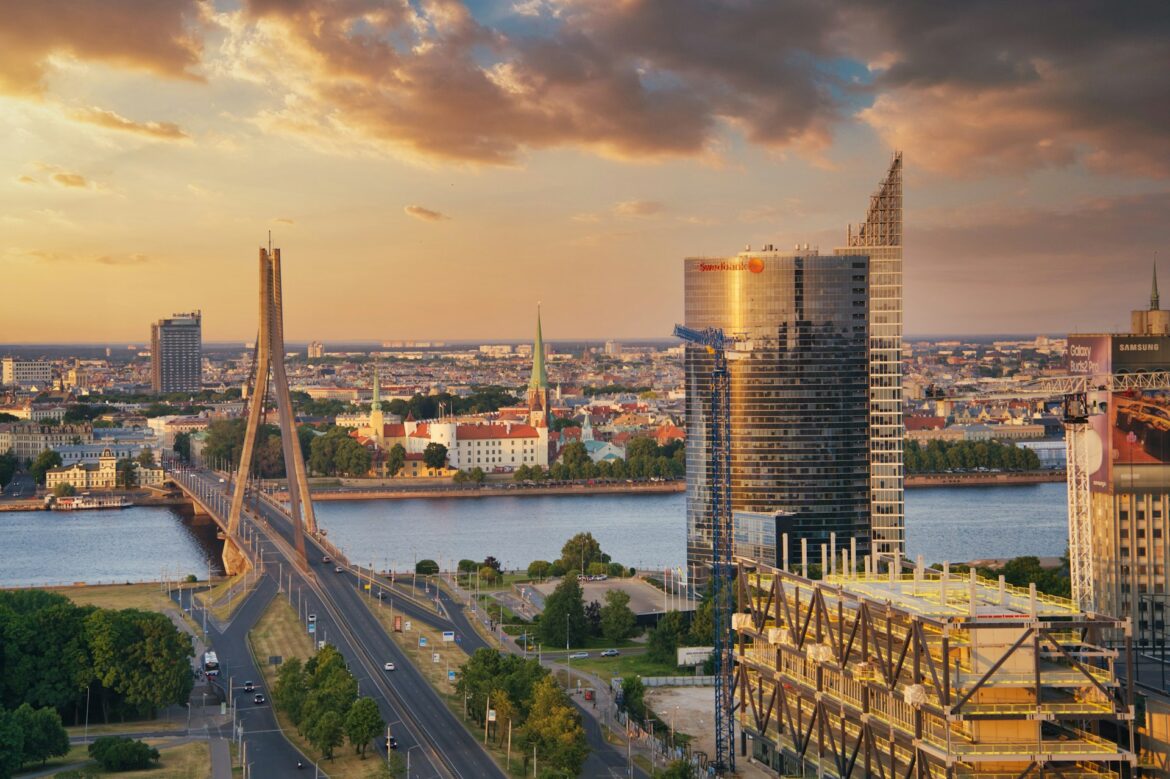Latvia offers both vibrant city life and peaceful small-town charm, and many people must choose between them. Living in Riga vs smaller Latvian cities presents very different experiences, as each place has unique advantages. Some prefer the fast-paced energy of Riga, while others feel more comfortable in quieter towns like Cēsis or Kuldīga. Your lifestyle, budget, and long-term goals all play a major role in making the right decision. Before settling down, it’s important to consider things like transportation, costs, and available opportunities. Fortunately, Latvia’s compact size means most cities are never too far apart. Even so, choosing the right environment to support your needs remains essential. So, let’s take a closer look at living in Riga vs smaller Latvian cities and weigh the pros and cons.
Cost of Living: Riga’s Expenses vs Small-Town Savings
Living in Riga is significantly more expensive than in smaller Latvian towns, especially when it comes to rent. You might pay twice as much for a city-center apartment compared to a similar flat in Valmiera. While grocery prices are similar, going out to eat in Riga usually costs more than in smaller towns. Riga also tends to have higher utility bills, particularly during winter when heating becomes essential. However, jobs in Riga often offer better salaries, which may help offset higher living costs. In contrast, smaller cities offer much more affordable housing and basic expenses, making budgeting easier. Many families and students choose small towns to save money while still enjoying a decent lifestyle. So, when comparing living in Riga vs smaller Latvian cities, the financial benefits of small-town life stand out.
Quick Cost Comparison
-
Rent in Riga: 2x higher than small towns
-
Dining out: Much cheaper outside the capital
-
Utilities: Often lower in smaller cities
-
Groceries: Similar pricing across Latvia
-
Salary: Usually higher in Riga
Career Opportunities: Riga Wins, but Not Always
Riga provides a broader range of career options, especially in sectors like IT, marketing, and international business. Many companies have their headquarters or main offices in the capital, creating more job opportunities across industries. Embassies, EU agencies, and global organizations are mostly based in Riga, attracting professionals and expats alike. However, competition for top roles in Riga can be intense, often requiring fluency in multiple languages and strong experience. Meanwhile, smaller Latvian cities like Liepāja or Daugavpils offer fewer jobs, but also less competition for available positions. Public sector, education, and tourism are among the main employment sectors in these towns. Thanks to the rise of remote work, many professionals now live outside Riga while working for companies based elsewhere. So, when it comes to living in Riga vs smaller Latvian cities, your field of work may heavily influence your choice.
Top Employment Sectors
-
Riga: Tech, finance, marketing, international business
-
Small cities: Tourism, education, public administration
-
Remote work: Opens options across Latvia
Transportation and Infrastructure: Capital Convenience vs Rural Simplicity
Riga offers a well-developed public transport system that includes buses, trams, and trolleybuses across the city. You can also use electric scooters, taxis, and ride-sharing apps for more flexibility. Still, traffic congestion during peak hours can be stressful and time-consuming, especially in central areas. In contrast, smaller cities feature shorter commute times, less traffic, and easy access to essential services. While public transport is more limited in smaller towns, walking or cycling is often enough for daily life. Having a car is usually necessary in rural areas, particularly for traveling between regions or reaching nature spots. Riga’s international airport is another big advantage, offering direct flights across Europe and beyond. If you travel frequently or value convenience, the infrastructure in Riga is hard to beat. However, if you prefer simplicity and speed, smaller cities may offer a more comfortable routine.
Lifestyle and Entertainment: City Buzz vs Village Calm
If you love entertainment, nightlife, and cultural diversity, Riga will not disappoint you. The city hosts concerts, festivals, exhibitions, and theater performances all year round. There are endless cafés, restaurants, nightclubs, and cultural events for every taste and age. You can also enjoy modern gyms, shopping malls, and co-working spaces that are harder to find in small towns. But with all these options come noise, crowds, and the fast pace of urban life. On the other hand, smaller Latvian cities provide a peaceful and relaxed lifestyle with less stress. You’ll still find charming cafés, local events, and recreational opportunities, but in a more personal setting. So, depending on your personality, living in Riga vs smaller Latvian cities offers either energy or tranquility.
Entertainment Highlights
-
Riga: Clubs, concerts, art galleries, major festivals
-
Small towns: Local fairs, outdoor sports, quiet cafés
-
City life: Fast and varied
-
Town life: Calm and cozy
Nature and Environment: Green Spaces vs Rural Landscapes
Riga has many beautiful parks, forested areas, and even beaches nearby like Jūrmala. Locals often enjoy weekend walks in Mežaparks or along the canal, even within the city. However, Riga still feels like a capital, with more pollution and less access to untouched nature. In contrast, smaller cities and towns bring you closer to forests, rivers, and national parks. Whether you live in Sigulda, Talsi, or Ludza, breathtaking scenery is just minutes away. The air feels fresher, and the streets are cleaner due to less traffic and lower population density. If daily access to nature improves your well-being, small towns might be ideal for you. Still, those who enjoy city parks and weekend escapes can also enjoy Riga’s nature scene. The key is to decide how much nature you want in your everyday routine.
Community and Social Life: Diverse vs Close-Knit
Riga’s social scene is vibrant, international, and constantly evolving. You can meet people from all backgrounds, thanks to its universities and expat communities. Networking, meetups, and events happen regularly, especially in creative and tech industries. However, city life often feels anonymous, and forming deep connections can take more effort. In smaller towns, the social life feels slower but more meaningful. People often know their neighbors, greet each other in shops, and attend community events together. That said, newcomers may find it hard to integrate in very traditional or close-knit circles. Riga offers more freedom to be anonymous or find like-minded groups. In contrast, small towns offer consistency and familiarity that some people value more. So, living in Riga vs smaller Latvian cities also depends on how you connect with people around you.
Community Vibes
-
Riga: Diverse, fast-moving, open to newcomers
-
Small cities: Friendly, stable, traditional
-
Social life: More events in Riga, deeper bonds outside
Safety and Cleanliness: Less Crime in the Countryside
Latvia is considered safe overall, but Riga naturally has more crime due to its larger population. Pickpocketing, bike theft, and occasional scams are more common in busy parts of the capital. Public areas can feel less safe at night, especially for tourists or newcomers unfamiliar with the neighborhoods. In smaller cities, crime rates are generally low, and streets feel safe even after dark. Families and retirees often choose rural areas for this reason alone. Cleanliness also tends to be better outside the capital, where streets are less crowded and vandalism is rare. However, emergency services like hospitals or police may respond slower in very small towns. So, you’ll have to weigh convenience and access against the quiet security of rural living. Again, the choice between living in Riga vs smaller Latvian cities depends on your priorities.
Education and Healthcare: Capital Leads, But Not Always
When it comes to education and healthcare, Riga clearly leads in quantity and variety. The city hosts top universities, international schools, private clinics, and specialized medical centers. This makes Riga attractive for families with children or people needing advanced healthcare. However, schools can be overcrowded, and doctor appointments may have long waiting times. Smaller towns offer smaller class sizes and more personalized healthcare, often with less pressure. That said, they may lack certain specialists or programs, meaning you’d need to travel to Riga for complex needs. If your family values peace and close teacher relationships, smaller cities could be ideal. But if you want access to every possible service, living in the capital makes more sense. So, when evaluating living in Riga vs smaller Latvian cities, your stage of life truly matters.
Service Comparison
-
Riga: More options, faster access to specialists
-
Small towns: Less crowded schools, more personal attention
-
Advanced care: Usually only in Riga
Which Place Is Best for You?
There’s no universal answer, only what works best for your goals and lifestyle. Riga offers opportunities, energy, and access to everything, but also comes with crowds and higher costs. Smaller cities promise peace, nature, and affordability, but they may lack variety and convenience. If you’re focused on career and social life, Riga might suit you better. If you seek quiet, community, and simplicity, a smaller Latvian town could be perfect. Fortunately, Latvia’s small size allows you to explore both worlds easily. You can live in one and regularly visit the other without much effort. So, in the end, the decision between living in Riga vs smaller Latvian cities is entirely personal—choose what brings you the most joy and balance.

